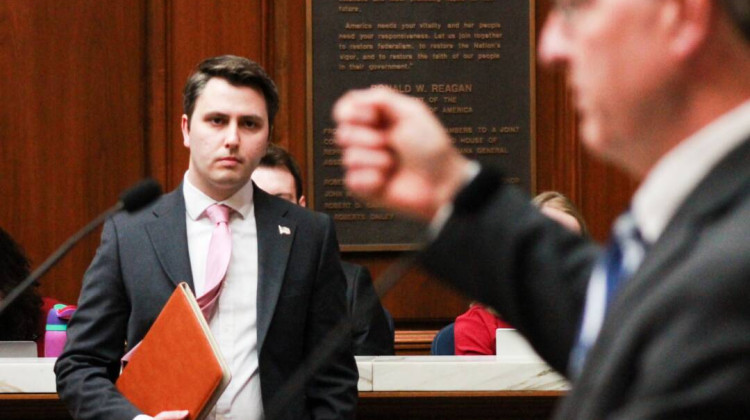
With a quick jab and even quicker gab, Muhammad Ali was a force to reckon with in the ring. Some of America's best sports writing has been devoted to the boxer, who's seen here in 1963.
Maybe it was the way his life transected areas that define America – race and religion; war and sports – or perhaps it was his own love for words. Whatever the reason, Muhammad Ali's life and career inspired writing that was nearly as captivating as the man himself.
With Ali – The Greatest – now dead at age 74, here's a list of some of the best stories written about him. Ali's large personality was perfectly suited to books, such as Norman Mailer's The Fight. For this subjective list, we're looking at shorter pieces. Feel free to share your favorites in the comment section.
'Lawdy, Lawdy, He's Great' – Mark Kram in Sports Illustrated, 1975
"True to his plan, arrogant and contemptuous of an opponent's worth as never before, Ali opened the fight flat-footed in the center of the ring, his hands whipping out and back like the pistons of an enormous and magnificent engine. Much broader than he has ever been, the look of swift destruction defined by his every move, Ali seemed indestructible. Once, so long ago, he had been a splendidly plumed bird who wrote on the wind a singular kind of poetry of the body, but now he was down to earth, brought down by the changing shape of his body, by a sense of his own vulnerability, and by the years of excess. Dancing was for a ballroom; the ugly hunt was on. Head up and unprotected, Frazier stayed in the mouth of the cannon, and the big gun roared again and again."
My Dinner With Ali — Davis Miller in the Louisville Courier-Journal, 1989; republished in Deadspin. 2013
" 'I know why this has happened,' Ali said. 'God is showing me, and showing you'—he pointed his shaking index finger at me and widened his eyes—'that I'm just a man, just like everybody else.'
"We sat a long, quiet time then, and watched his flickering image on the television screen. It was now 1971 and there was footage of him training for the first Frazier fight. Our Most Public Figure was then The World's Most Beautiful Man and The Greatest Athlete of All Times, his copper skin glowing under the fluorescents, secret rhythms springing in loose firmness from his fingertips.
" 'Champ, I think it's time for me to go,' I said again and made an effort to stand.
" 'No, stay. You my man,' he says, and pats my leg. He has always been this way, always wanted to be around people. I take his accolade as one of the greatest compliments of my life."
Showing Muhammad Ali as a Martyr for Refusing to Fight in a Bad War — photographer George Lois writes about his 1968 Esquire cover.
" 'Hey George, this cat's a Christian!'
"I blurted back, 'Holy Moses, you're right, Champ!'
"I explained to Ali that St. Sebastian was a Roman soldier who survived execution by arrows for converting to Christianity. He was then clubbed to death, and has gone down in history as the definitive martyr. Before we could affix any arrows to Ali, he got on the phone with his religious leader, Elijah Mummad. Ali explained the painting in excruciating detail. He was concerned about the propriety of using a Christian source for the portrayal of his martyrdom. He finally put me, a non-practicing Greek Orthodox, on the phone. After a lengthy theological discussion, Elijah gave his okay."
Muhammad Ali in Excelsis — Peter Richmond in GQ, 1998
"I'd expected the disease to have robbed him of the vitality that once exploded from him. I'd expected the disease to represent the ultimate cruel triumph of the world that had always wanted the black boy from Louisville, Kentucky, to shut the hell up."
"But up close, I am discovering that his affliction has taken nothing away, none of the energy, none of the wit, none of the pride; it has only bound all of it, captured and constricted it, with the entirely unexpected result that, as an aeon of geologic forces can compress a large vein of coal into a very small diamond, whatever was the essence of Muhammad Ali is now somehow magnified. He is at last what he always pretended to be but never was: the Greatest. For it must be axiomatic that if someone calls himself the Greatest, as Ali did for years, he cannot possibly be; the Greatest would never have to label himself as such. Only when he was forced to stop proclaiming his greatness did it become possible."
The Outsized Life of Muhammad Ali -- David Remnick in The New Yorker, 2016
"Cassius's father was a man of thwarted dreams. He distrusted whites, and felt he was prevented from becoming a painter of canvasses rather than of signs and billboards. He drank too much, and his bitterness sometimes tipped into chaos. He was, one of Ali's friends said, the source of a great deal of pain in the family. His mother, Odessa, was usually the object of Cassius, Sr.,'s fury and fists, and she was the boy's comfort. Odessa was the first to know that her son was hyperverbal and quick with a left hand. As she once recalled, 'He was always a talker. He tried to talk so hard when he was a baby. He used to jabber so, you know? And people'd laugh and he'd shake his face and jabber so fast. I don't see how anybody could talk so fast, just like lightning. And he never sat still. He was in the bed with me at six months old, and you know how babies stretch? He had little muscle arms and he hit me in the mouth when he stretched and it loosened my front tooth and it affected my other front tooth and I had to have both of them pulled out. So I always say his first knockout punch was in my mouth.' "
Muhammad Ali, who riveted the world as 'The Greatest,' dies – the AP's Tim Dahlberg, 2016
" 'I don't call him the best boxer of all time, but he's the greatest human being I ever met,' Foreman said. 'To this day he's the most exciting person I ever met in my life.'
"Born Cassius Marcellus Clay on Jan. 17, 1942, in Louisville, Kentucky, Ali began boxing at age 12 after his new bicycle was stolen and he vowed to policeman Joe Martin that he would 'whup' the person who took it.
"He was only 89 pounds at the time, but Martin began training him at his boxing gym, the beginning of a six-year amateur career that ended with the light heavyweight Olympic gold medal in 1960."
Of writing the obituary of a man who both reshaped and transcended the world of boxing, the AP's Dahlberg says via Twitter that it was "a labor of love. Very sad to see him go."
9(MDEwMDc1MzM3MDEzNDczOTA0MDc1MzViMQ001))
 DONATE
DONATE






 View More Articles
View More Articles


 Support WFYI. We can't do it without you.
Support WFYI. We can't do it without you.